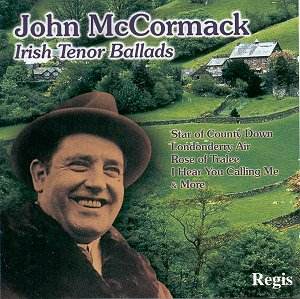The Star of the County Down
The Garden where the Praties Grow
The Kerry Dance
Down by the Salley Gardens
Mother Machree
The Rose of Tralee
Believe me, if all those endearing young charms
The Green Isle of Erin
Off to Philadelphia
The Dawning of the Day
Oft in the Stilly Night
Kathleen Mavourneen
When Irish eyes are smiling
Bantry Bay
The Old House
By the short cut to the Rosses
The Irish Emigrant
Love Thee, Dearest, Love Thee
She Mov’d thro’ the Fair
Terence’s Farewell to Kathleen
The bard of Armagh
Molly Brannigan
Londonderry Air
I hear You Calling me
No one should be without a collection of McCormack’s
Irish songs and ballads. His legato phrasing, his breath control, unimpeachable
diction, the beauty of his tone, its range from floated head voice to
a plangent descent to the high baritonal were the mechanics of the tenor’s
singing, whether it was Mozart or Thomas Moore. Which is not to imply
a promiscuous use of his resources and their indiscriminate employment.
On the contrary the ballads were neither ennobled nor elevated by such
beauty – they were, rather, open to the inflections and sensitivities
of his voice, and their meaning explored from within, in an act of sublimation
and exploration.
McCormack’s was truly the art that conceals art. The
supposed artlessness of his singing of these songs is in fact a supreme
artfulness. There are such metrical subtleties here, slightly lengthened
or shortened note values, such winning phrasing, that it is impossible
to resist and nor would one want to, whatever conceptions or misconceptions
one might hold of minstrelsy of this type. The level of identification
and sheer characterisation is pervasive. Listen to his singing of the
phrase the image of me in The Garden where the Praties grow with
its saucy half chuckle and onrushing breathlessness. These apparently
simple songs are usually accompanied by an interior life of their own.
In The Rose of Tralee the ardent head note is accompanied by an expressive
"cracked" note. Or in The Green Isle of Erin where McCormack
throbs passionately in a way not dissimilar to the operatic – a path
he spurned early in his career. Oft in the Stilly Night is one of my
favourites in this collection of familiar and imperishable records and
is significant for the colouristic use McCormack makes of the song,
the shading of the words sad memory and days and the sense
that the song’s meaning and the singer’s experience of it are coalescent.
In Terence’s Farewell to Kathleen, a forlorn tale of love and loss,
the dramatic interiority of the flummoxed, increasingly desperate, ultimate
resigned, youth is conveyed with theatrical and expressive intensity
in a way which lifts the song to the heights of lyrical monologue. Elsewhere
and everywhere attention to detail is accompanied by understanding of
text. The bulk of the recordings are accompanied by Edwin Schneider,
McCormack’s loyal pianist for many years and by Gerald Moore who took
over toward the end at a time when the tenor’s voice had begun somewhat
to fray (it’s also instructive to listen to the Moore-accompanied sides
to hear how diminishing vocal resources can be harnessed). Some of the
transfers leave rather a lot to be desired. When Irish Eyes are smiling
may be the earliest here, recorded in 1916, but is very swishy. On several
tracks there is also something reminiscent of our old friend Artificial
Stereo; a rather awful hollow echo is the result. Never mind, McCormack
vincit omnia. There are many McCormack compilations around and this
is a decent selection.
Jonathan Woolf


